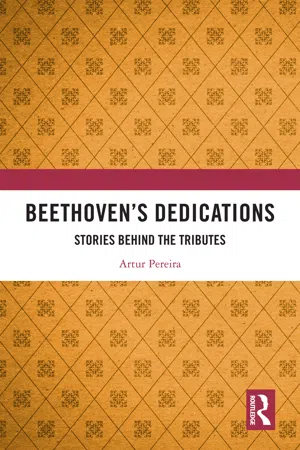![]()
III
Stories behind the tributes
![]()
8 Official dedications
The work was composed for Your Imperial Highness or, rather, owes its existence to you; and is the world … not to know about it? … I shall always revere Your Imperial Highness as my most noble patron and, wherever possible, make this known to the world at large.1
1 A, 585, 1063; B, vol. 3, 272; vol. 5, 184.
Beethoven’s communication to Archduke Rudolph confirms he perceived dedications as a public bond between him, the work and the dedicatee. Albeit motivated by different reasons, a dedication’s purpose remains the same – to inform the world that he presented his works to specific people.
This chapter lists all Beethoven’s dedicatees in alphabetical order, the works dedicated to them and the original dedications, which appeared in print during his lifetime. It also lists a few works issued shortly after Beethoven’s death: Elegischer Gesang Op. 118 (August 1827); Missa solemnis Op. 123 (March/April 1827); String Quartet Op. 130, Grosse Fuge and its piano arrangement Opp. 133 and 134 (May 1827); and String Quartets Opp. 131 (May/June 1827), 132 (August 1827) and 135 (August/autumn 1827). They are included as they are known to have been stipulated by Beethoven before his death, and therefore qualify as official dedications.
Beethoven’s official dedications are presented in the following format: name of dedicatee,2 title of work and opus number (or WoO number), place of publication, publisher, date of publication, and complete transcription of the original dedication (in italics). The dedications are transcribed exactly as found on the new thematic catalogue of Beethoven’s works and Alan Tyson’s The Authentic English Editions of Beethoven. Works dedicated to the same individual appear in chronological order of publication.
2 As found in Peter Clive’s Beethoven and His World (2001).
Biographical accounts of Beethoven, his dedicatees, the relationship which once existed between them, and reflections on potential motivations behind the dedications are presented in self-contained narratives.
Beethoven’s dedications are mostly in French, a large percentage in German, seven in Italian and one in Latin. The original edition of the Piano Sonatas Opp. 81a and 106 was issued with two different title pages, one in German, the other in French, so both have been transcribed. Dedications in the English language appear solely in the British editions of String Quartets Op. 59, Violin Sonata Op. 96, Seventh Symphony piano arrangements, and Piano Sonata Op. 111.
Beethoven’s dedications generally appear on the title-page of a composition, but in String Quartets Op. 59, Fidelio (third version, vocal score), Wellingtons Sieg, Seventh Symphony, Piano Sonata Op. 101, Missa solemnis and Ninth Symphony, they are on the second sheet.
Alexander I, Emperor of Russia (1777–1825)
- Three Violin Sonatas, Op. 30
Vienna: Bureau des Arts et d’Industrie,3 May/June 1803.
TROIS SONATES /… composées et dediées / à Sa Majesté / ALEXANDRE I, / Empereur de toutes les Russies / par / LOUIS van BEETHOVEN.
The dedication of the Violin Sonatas Op. 30 to the Russian Emperor Alexander I can be regarded as the first dedication inspired by political affinity. The sonatas were composed during spring 1802 and first published in May/June 1803, approximately two years after Alexander was crowned Emperor.
3 Owing to this publisher’s inconsistent use of its name, the present format represents a normalisation and it has been used throughout.
Soon after his rise to power the young emperor began reform programmes rooted in Enlightenment ideals: he recalled the India-bound invasion force, brought back into service twelve thousand officers and functionaries who had been discredited and humiliated by his predecessor (Paul I), reinstated foreign book circulation in Russia, reopened private publishing houses and disbanded the secret police known as ‘Secret Expenditure’.4 These are just a few of Alexander’s inaugural measures. Beethoven would have heard of this, given the close association with Count Razumovsky (the Russian ambassador in Vienna) and Count Johann von Browne (a former officer of the Russian Army).5 Alexander’s deeds would have been a hot topic of discussion within these circles, and as a keen enthusiast of Enlightenment principles Beethoven would have identified with the emperor’s outlook.
4 Troyat, Alexander of Russia: Napoleon’s Conqueror, 59.
5 Clive, 60–61, 277–278.
In August 1802, another advocate of the Enlightenment, Joseph von Sonnenfels, was presented with the dedication of the Piano Sonata Op. 28 (see below, Sonnenfels). The following year Beethoven planned to dedicate the Eroica to Napoleon honouring what he considered to be a towering example of Enlightenment leadership. Dedications to several promoters of this ideology appeared around the time of Beethoven’s Heiligenstadt crisis, when he became aware that his loss of hearing was irreversible. This crisis may have enhanced his predisposition towards those ideals, explaining his choices of dedicatee for works published then. A change in his compositional output is also evident. On 23 November 1802, his brother Carl wrote to the publisher Johann André that Beethoven had immersed himself in loftier types of composition after returning from Heiligenstadt:
If you should want three Piano Sonatas, I could not provide these for anything less than 900 florins, everything in Viennese Currency. Also, you cannot receive these all at once, but one every five or six weeks, because my brother no longer troubles himself very much with such trifles, and writes only oratorios, operas, etc.6
6 Alb, vol. 1, 84; B, vol. 1, 134.
The Oratorio Christus am Oelberge was written without commission and it illustrates Carl’s remark about Beethoven’s increasing drive to compose larger-scale works. It also provides a glimpse into his frame of mind in the months following the Heiligenstadt period.7 This is when he dedicated his violi...
